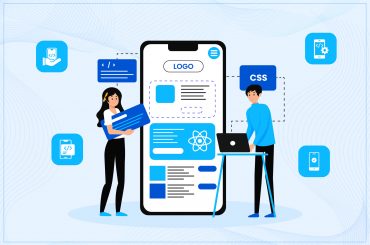Application software helps both businesses and customers interact with each other and establish new market possibilities for earning and inspiring others to come up with a new business vision in the future. However, business owners are often confused regarding what needs to be adopted among the different types of application software available. Mobile App Development is the leading requirement of online companies these days and it’s further distributed into 3 essential categories- Native Apps, Web-Apps & Hybrid Apps.
Are you confused about choosing the right mobile app development approach amongst the 3 for your app-building project? Then you’re not alone. Numerous start-ups and small-scale units act consciously while deciding for their app development project as the competition is high and they can’t go for a massive investment right at the initial stage of their app-building project. However, deciding to approach the right app building service providers can help them a lot on their Mobile App Development project.
Through this post, we want to determine the difference between Web-Based, Native & Hybrid Mobile Apps and would also suggest where you need to use them separately. As such, you’d be able to decide what options you can go for regarding your business model & objectives. Let’s get started!
What is a Web-Based App?
Starting with web-based apps, you’d be surprised to know that these are not mobile applications at all. These are instead websites that support user appearance inspired by mobile apps. The apps are so popular that many businesses even place them on mobile app stores (Google & Windows only) to gain considerable user recognition and attraction to stimulate their web presence. The mobile app developers are required to write the app’s UI in HTML5 and typically run the same on a browser.
Enlisted are the main features of such web-based apps to review for detailed insight:
- Users can access it like any web page
- The users are required to navigate through a special URL
- The app can be installed on their mobile home screen via a bookmark to the corresponding page
- Support native app like functions in the browser
- Users need to swipe horizontally to reach out to other segments of the app
- Promotes offline access due to browser caching
Using such features, companies can save a lot out of their total app development budget and that’s why usually blogging websites are supposed to amplify their online presence residing over different app stores. You may also go for pure native apps if you’re looking for added features & functionalities.
How to Differentiate a Native App?
Native apps on the other hand are genuine mobile apps dedicated to either of the mobile app platforms and operating systems. One native app often supports one specific platform- iOS, Android or Windows. These apps are usually produced in any one of the leading app development languages and provide unique UI that can’t be accessed on another platform. Also, these apps are dedicated to one device & its corresponding framework most of the time. Here are the added features of the application:
- Native Apps are found on a single & specific app store, either Google Play Store or Apple Store
- Native Apps can easily be accessed through their relative icons displayed on the device home screen
- The app can use various device functionalities and features limited to a single operating system
- The app can also opt for standard OS gestures or app defined gesture support
- It can also trigger the notification segment of the device
- Unlike Web-based App, Native App can also run in the background while users perform multitask on their device.
Using native apps for your online business, you can build a unique customer base for your app store product that stays inspired by your latest products and services.
Why Use Hybrid Apps?
Hybrid Apps are a combination of Native & Web Apps. Combining the other two apps, the developers and app owners usually enjoy double perks and benefits of promoting their products and services online. As such, they want to target a broader customer base and bring more innovation to their business ideas. Hence, Hybrid Apps are subject to greater client requirements and cover a lot of space on the popular app stores. Mentioned below are the top features of such apps that the mobile app developers & online clients are crazy about:
- You could mention and promote Hybrid Apps on any app store available
- Developers can write these apps in the HTML
- The app can again be rendered in a browser; however, the browser needs to be embedded within the app
- The apps support a cross-platform Mobile App Development framework
- Users can run the app on multiple devices
- For developers, the mobile app can reduce the entire development cost and efforts
- React Native Mobile App& Flutter are some popular frameworks used to create such applications
- Developers also use tools like Sencha Touch & PhoneGap along with HTML to develop corresponding mobile apps
- Hybrid Apps are proficient in letting developers use one language to create apps for multiple platforms
Therefore, most mobile app owners are looking for Hybrid App building solutions. But some applications can’t be created to provide for cross-platform client pre-requisites. These applications are often called special native integrated applications and are provided by the OS separately. For example, iTunes can’t be used on an Android Device anyway. The device companies also develop their integrated native apps dedicated to a specific device.





